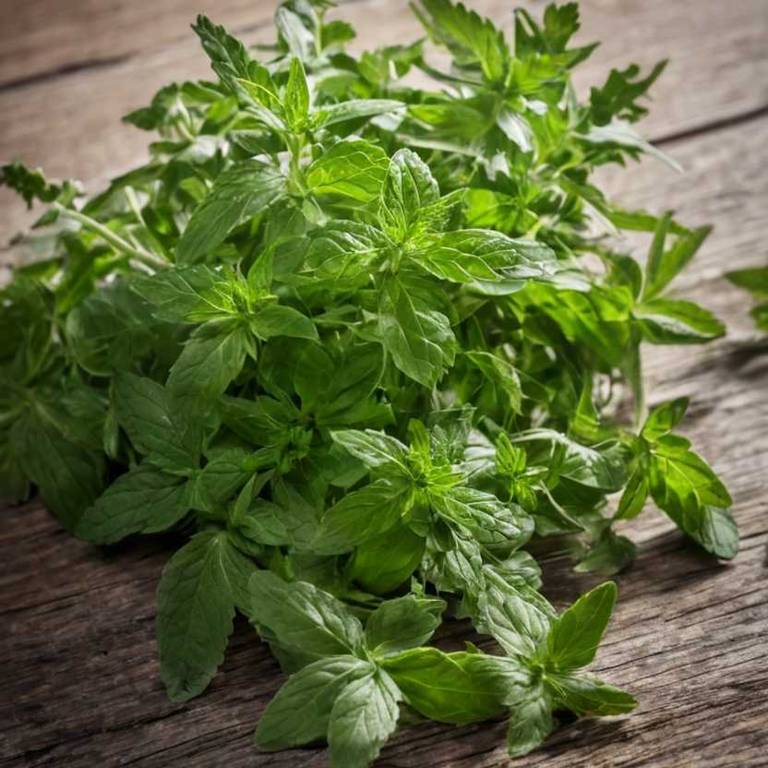By Leen Randell
Updated: Jul 05, 2024
What Are The Medicinal Properties Of Melissa Officinalis (Lemon Balm)?

Melissa officinalis, also known as lemon balm, has health benefits such as calming the mind and body, reducing stress and anxiety, and promoting restful sleep.
The herb's medicinal constituents include rosmarinic acid, apigenin, and luteolin, which contribute to its anti-inflammatory, antispasmodic, and antimicrobial properties. Lemon balm is prepared as a tea, oil, or tincture, which can be used to soothe digestive issues, calm headaches, and alleviate symptoms of menopause. Possible side effects of lemon balm include drowsiness, nausea, and allergic reactions.
Precautions should be taken when using lemon balm, especially when pregnant or breastfeeding.
This article explains the health benefits, active constituents, medicinal preparations, possible side effects, and precautions related to Melissa officinalis.
- What are the health benefits of Melissa officinalis?
- What are the active constituents of Melissa officinalis?
- What are the medicinal preparations of Melissa officinalis?
- What are the possible side effect of using Melissa officinalis improperly?
- What precautions to take when using Melissa officinalis medicinally?
What are the health benefits of Melissa officinalis?
Melissa officinalis, also known as lemon balm, has health benefits such as reducing anxiety and stress, promoting sleep, and soothing digestive issues.
Its calming properties are attributed to its rosmarinic acid content, which has anti-inflammatory effects.
Studies have shown that lemon balm can alleviate symptoms of restlessness and insomnia, while also exhibiting antimicrobial properties, making it a natural remedy for promoting overall well-being.
Here's a detailed article about the 10 health benefits of Melissa officinalis.
What are the active constituents of Melissa officinalis?
Melissa officinalis, also known as lemon balm, has active constituents such as rosmarinic acid, caffeic acid, and terpenoids, including borneol and linalool.
These compounds have been shown to have a range of medicinal properties, including anti-inflammatory, antimicrobial, and antispasmodic effects.
Additionally, lemon balm contains flavonoids, particularly kaempferol and quercetin, which have been reported to possess antioxidant and calming properties, contributing to the herb's traditional use in promoting relaxation and alleviating stress.
Here's a detailed article about the 10 active constituents of Melissa officinalis.
What are the medicinal preparations of Melissa officinalis?
Melissa officinalis, also known as lemon balm, has medicinal preparations such as teas, tinctures, and essential oils that are used to alleviate digestive issues, stress, and anxiety.
The plant's volatile oils are also used to soothe mouth and throat irritations, as well as to calm skin irritations and minor burns.
Additionally, lemon balm is sometimes used topically to treat eczema and other skin conditions, promoting relaxation and reducing inflammation.
Here's a detailed article about the 10 medicinal preparations of Melissa officinalis.
What are the possible side effect of using Melissa officinalis improperly?
Improper use of Melissa officinalis, also known as lemon balm, increases the chances of experiencing side effects such as dizziness, headaches, and fatigue.
In rare cases, high doses can cause stomach upset, nausea, and vomiting. Additionally, lemon balm can interact with certain medications, such as sedatives and antidepressants, reducing their effectiveness or increasing the risk of adverse reactions.
Pregnant women and children should use it with caution, as excessive consumption can be harmful.
Here's a detailed article about the 10 most common side effects of Melissa officinalis.
What precautions to take when using Melissa officinalis medicinally?
Before using Melissa officinalis, also known as lemon balm, for medicinal purposes, you must take precautions such as consulting with a healthcare professional, particularly if pregnant or breastfeeding.
Lemon balm can interact with certain medications, including antidepressants, and may exacerbate conditions like epilepsy and high blood pressure. Also, monitor dosages, as excessive consumption can cause drowsiness and dizziness.
Ensure quality of the herb and follow proper preparation methods to avoid contamination or adulteration.
Here's a detailed article about 10 precautions to take when using Melissa officinalis.